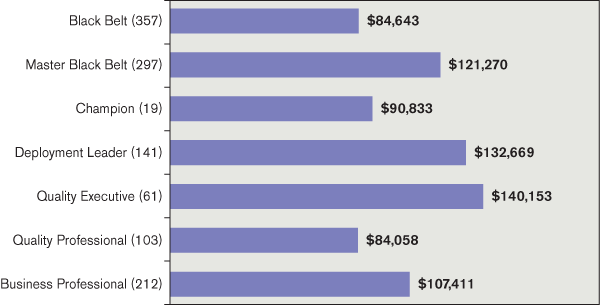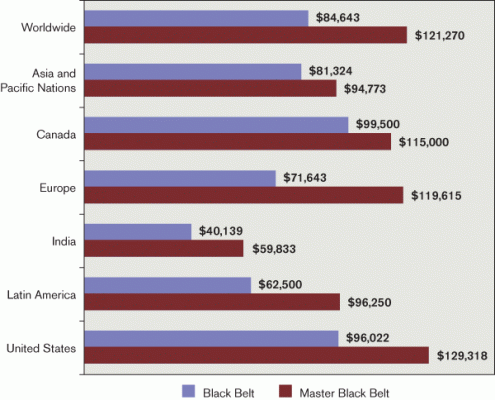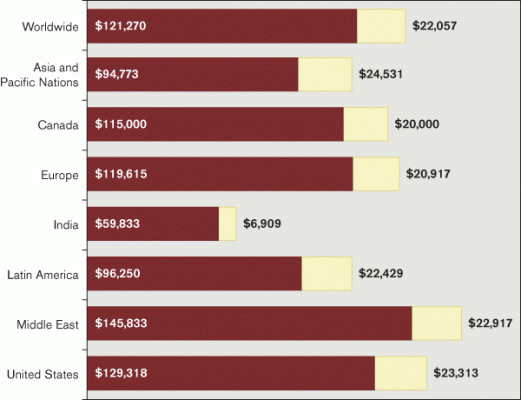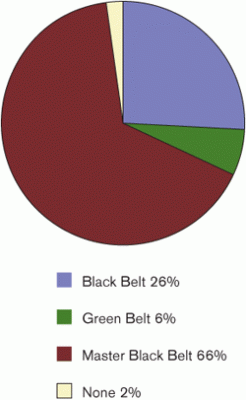
The following are selected highlights of the 10th Annual iSixSigma Global Salary Survey. The complete report, with more analysis and extended findings, including results for Black Belts (BBs), Master Black Belts (MBBs), Deployment Leaders (DLs), Champions, Quality Professionals (QPs), Quality Executives (QEs) and Business Professionals (BPs); regional highlights; bonuses; how education and experience affect compensation; and much more, is available for purchase on the iSixSigma Marketplace.
In the 10 years that iSixSigma has produced its Global Salary Survey, the world has undergone sweeping changes including natural disasters, the collapse of economies and the release of the iPhone. Throughout all of these developments, Six Sigma has remained a source of inspiration and progress for thousands of companies.
BBs represent the largest group of people surveyed with 30 percent of the respondents indicating that they are currently working as a Black Belt. MBBs represent the second largest group of professionals surveyed at 25 percent of the total. Next come BPs, comprising 18 percent of respondents surveyed. Approximately two-thirds of respondents (69 percent) are from the United States, with 10 percent each from Europe and India. At the other end of the scale, Africa and the Middle East each represent just 1 percent of survey respondents.
BBs saw a slight increase in their average annual salary, up to $84,643 worldwide (Figure 1). QPs are neck and neck with BBs, with an average annual salary of $84,058. Of all the roles surveyed, QEs have the highest average salary at $140,153.

Since the salary research conducted by iSixSigma began in 2004, the average MBB salary has increased at a greater rate than the average BB salary. According to current research, the average MBB salary is 42 percent higher than the average annual salary for BBs (Figure 2).

Globally, MBBs reported an average annual bonus of $22,057 (Figure 3).

Behind the lofty average salary of QEs are considerable experience and qualifications. The majority of QE respondents have 15 or more years of experience and hold some level of Six Sigma certification. MBB-certified QEs represent 66 percent of the total, and 26 percent of QEs are BB certified (Figure 4). Only 2 percent hold no Six Sigma certification.

How the Survey Is Completed
Data for the Annual iSixSigma Global Salary Survey is collected from the iSixSigma Job Shop, where participants answer several required questions (e.g., location, highest level of education, salary range, etc.). Only information from those who provided or updated their information within the prior 12 months was included in the analysis.
This year’s salary survey includes responses from 1,391 participants.
Please note: Survey participants provide salary information by ranges, beginning at < $20,000, then $20,001 to $25,000, continuing at increments of $5,000 to the final salary range of > $200,000. In analyzing the salary data, each range was converted to the median salary for that specific range. For example, < $20,000 was calculated to be $17,500; $20,001 to $25,000 was calculated to be $22,500; and so on.
Role Definitions
Black Belt: Full-time professional who leads Six Sigma projects. Typically has four to five weeks of classroom training in methods, statistical tools and team skills. Sometimes provides coaching and Six Sigma expertise to Green Belts.
Master Black Belt: An expert in Six Sigma methodology and statistical tools who provides strategic Six Sigma guidance within a specific function or business unit. An MBB often has prior experience as a BB. Responsible for coaching, mentoring and/or training BBs, an MBB often helps the Six Sigma Deployment Leader and Champions keep the initiative on track.
Champion: Middle- or senior-level executive who sponsors a specific Six Sigma project or effort, ensuring that resources are available and cross-functional issues are resolved.
Deployment Leader: Senior-level executive responsible for implementing Six Sigma enterprise wide. Typically reports to higher C-level executives. Responsible for developing, implementing and maintaining a standardized, company-wide quality system focused on customer satisfaction, defect prevention and continuous improvement.
Quality Professional and Quality Executive: While not universally regarded as Six Sigma roles, QPs and QEs may have Six Sigma responsibilities and qualifications.
Business Professional: Although they may not be in Six Sigma roles currently, the majority of these professionals possess Six Sigma certification and may have project experience.
To purchase the complete report, please visit the iSixSigma Marketplace.